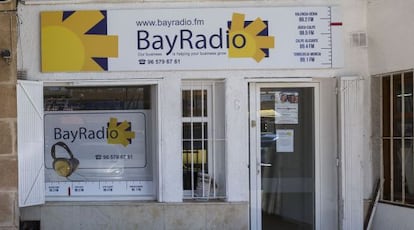Four hundred pirates on the airwaves
The Valencia region is rife with unlicensed radio stations, which often escape fines from authorities

A mixing console, a computer, an antenna and a small transmitter worth a total of €1,500 is all that you need to take control of a radio frequency. This is the equipment used by a thirtysomething who broadcasts dance music sessions out of Jávea, a popular resort on the Mediterranean coast.
“I don’t do this for profit,” he replies via email. Yet his website offers ad space, mobile disco services and even t-shirts. Juan (an assumed name) juggles his dexterity at the mic with a day job as a Civil Guard officer, according to the local businessman who has filed a complaint with the Spanish military police about the amateur DJ's activities.
Pirates have taken the Valencian airwaves by storm. More than 400 unlicensed stations are broadcasting across the region with near complete impunity, sometimes even pushing out the legal stations by interfering with their frequencies.
The government’s sluggishness when it comes to issuing fines for this activity, coupled with the technical complexity involved in catching wrongdoers, has created a breeding ground for a movement that has been growing since 2007.
Valencia is the third largest pirate den in Spain, behind the Canaries and Andalusia
The outlaw broadcasters are also contributing to the flow of layoffs and shutdowns at the 125 legal stations operating in the country, and whose advertising revenues have been slashed by half, according to industry figures
Alicante, one of the three provinces in Valencia, is pirate heaven. Over half the region’s unlicensed stations are located here. In fact, only 56 out of the 220 radio stations in the area actually have a license from the local government.
The Spanish Commercial Radio Broadcasting Association (AERC) lists the Valencia region as the third-largest pirate den in Spain, behind the Canary Islands and Andalusia.
To be illegal is to live in limbo. You do not exist as far as the authorities are concerned, and you have no fear of being inspected. As a further bonus, market logic dictates that costs are kept down to a minimum, giving you an edge in the race for a bite from the ever-shrinking advertising pie.
“This is unfair competition,” complains an entrepreneur from La Marina Alta, the comarca (an administrative division similar to a county) where Jávea is located. This professional, who has worked in the radio industry for 28 years, figures that each unlicensed station broadcasting in English out of Jávea, a town with a large British population, makes around €500,000 a year.
“In England all of this would be a crime,” says an angry entrepreneur
In La Marina Alta alone — an area covering 760 square kilometers, and which includes the popular seaside towns of Dénia, Jávea and Calpe — there are four legal stations (SER Dénia, Radio Litoral, Radio Marina Alta and Cope) and 45 unlicensed ones, according to regional government figures. So far, authorities have only issued a dozen or so fines in La Marina Alta, although it was unclear whether the violators had stopped broadcasting after that.
“In England all of this would be a crime,” complains a businessman who is on a personal legal crusade against the radio pirates. So far, he has obtained three favorable court rulings in five years – but no station closures.
This man, who is director of a commercial radio station, has lodged a complaint against Activa FM for lacking the proper license. He says that this group, which broadcasts on six frequencies in Dénia, Benidorm and Valencia, actually interfered with radio communications at Alicante airport.
“I refuse to make any statements and I am not part of Activa FM,” says the person who picks up the cellphone number shown on Activa’s website. A few minutes later, another man who declines to supply his surname introduces himself as a former manager of Activa, and complains about the discretionary manner in which licenses are issued.
This man also suggests that this entire story is part of a campaign by SER radio station, which belongs to PRISA, the parent company of EL PAÍS. He argues that his activity is legal because he pays his workers and honors the fees due broadcast copyrighted material charged by SGAE, the intellectual property management association.
Their signals sometimes come through more clearly than those of licensed stations
Pirates conceal their equipment on the rooftops. They place their antennas on property owned by third parties in exchange for free advertising. Relatively accessible technology provides them with wider reach, and their signals are often clearer than those of licensed stations. The secret lies in the fact that clandestine radios save themselves hefty electricity bills, which come from having an antenna on top of a tall communications tower.
“These pirates play at being entrepreneurs with advantageous conditions. Those of us who abide by the law become burdened by debt. And now we are having a really hard time, while these intruders are weathering the storm better,” complains a businessman from La Marina Alta, who warned regional authorities about the problem a full seven years ago.
The obvious question is, why has the Valencia government not gone after the clandestine stations?
“It is a complex process. We have the resources that we have. It is not easy to know who is behind these companies, and besides, ownership changes. It is hard to catch them,” says a source from the regional government.
Radio is a medium that creates opinion. But given that a third of the 201,000 registered residents of La Marina Alta are foreigners from other European countries – mostly British and German – experts consulted for this story do not feel that the government’s tolerance for pirate radio stations is related to a strategy to help media that support the ruling Popular Party (PP).
“Political affinity is no justification for law enforcement. If they incurred in an irregularity, the government should step in regardless of these companies’ political color,” says Alfonso Ortega, a professor of private international law at Miguel Hernández University in Elche.
“It’s like opening a beach bar without a license”
“It’s like opening a beach bar without a license. You work, and with a bit of luck you make some money,” says Cornelius Nijssen, 51, who owns an unlicensed radio station called Xtra FM. Nijssen is the only one of the dozen or so entrepreneurs contacted by this newspaper who openly admitted to the fact that he lacks a license. His clearly visible studios in L’Alfàs del Pi broadcast to some 30 municipalities, including Altea, Jávea, Dénia, Benidorm and Oliva. The programming, which combines music and information in English, Dutch and German, is listened to by around 32,000 people a day, according to the owner.
Nijssen makes €130,000 a year in advertising revenues, and spends €8,000 a month on rent, SGAE fees and paying his eight workers. He himself makes €1,200 a month, despite more than 20 years’ experience as chief of content at stations in Germany and The Netherlands. His equipment is worth an estimated €150,000. “It’s better than what they have at Los 40 Principales,” he boasts, in reference to a major chart music station in Spain.
His station has been on air in La Marina since 2005, and is aimed at a highly prized sector: foreigners over 40 years old with a lot of money to spend.
Nijssen says his activity does not harm licensed broadcasters. “We do not create interference nor do we steal customers away from them.” Xtra FM uses three frequencies that it rents from a broadcasting center associated with the regional government.
Nijssen knows that his business could be shut down. “It could happen any moment. I think about it every day. But all these years I have done what I like doing. I have a wife and a good daughter. My entire life is legal.”
Tu suscripción se está usando en otro dispositivo
¿Quieres añadir otro usuario a tu suscripción?
Si continúas leyendo en este dispositivo, no se podrá leer en el otro.
FlechaTu suscripción se está usando en otro dispositivo y solo puedes acceder a EL PAÍS desde un dispositivo a la vez.
Si quieres compartir tu cuenta, cambia tu suscripción a la modalidad Premium, así podrás añadir otro usuario. Cada uno accederá con su propia cuenta de email, lo que os permitirá personalizar vuestra experiencia en EL PAÍS.
¿Tienes una suscripción de empresa? Accede aquí para contratar más cuentas.
En el caso de no saber quién está usando tu cuenta, te recomendamos cambiar tu contraseña aquí.
Si decides continuar compartiendo tu cuenta, este mensaje se mostrará en tu dispositivo y en el de la otra persona que está usando tu cuenta de forma indefinida, afectando a tu experiencia de lectura. Puedes consultar aquí los términos y condiciones de la suscripción digital.









































